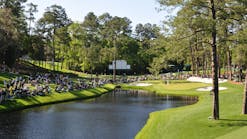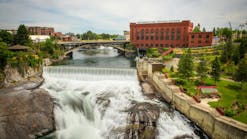Freshman just starting out in college sometimes are urged not to jump into their new lives all at once, but instead take a little time to get their feet wet.
At Flagler College in St. Augustine, Fla., everybody used to get their feet wet.
Just outside the front door of Kenan Hall, a classroom and facilities building used by 2,000 students every day, an ankle-deep puddle formed every time it rained.
Flagler College officials wanted to do something about it, but it would take some creativity and effort. St. Augustine does not allow new tie-ins to its storm system, requiring instead that storm water be treated onsite.
A further challenge was that Kenan Hall was built in the 1880s, originally to house employees of the Ponce De Leon Hotel. This was a draw for the wealthy, who would travel with their servants from the cold Northeast to spend the winter months in the Florida sunshine. It was built by Henry Flagler, who—along with his business associate and friend, John D. Rockefeller—founded Standard Oil.
The building itself was the first large building in the U.S. made entirely of poured coquina shell concrete, trimmed in terra cotta red; thus, any improvements had to adhere to historic-district guidelines.
Sharon Fowler, principal of the landscape architecture firm Hauber, Fowler & Associates, said the goals were first to find a solution to the drainage issues on the site and then to complement and reflect the historic architecture.
Permeable clay pavers in two colors—light gray and a terra cotta blend—were used to build a 5,300-sq-ft plaza. The colors are almost a perfect match for the building. The plaza has movable tables and chairs clustered around columns that are wired for electricity, providing power for laptops. The plaza also is used for student events, meals and parties.
The best part: When it rains, the water hits the pavers and disappears.
Larry Weeks, director of business services and campus planner, said that exfiltration systems, which look similar to plastic Lego boxes, previously had been used on the campus to fulfill the city’s storm water ordinances.
But underground boxes do not deliver the benefits of a popular gathering spot where students can watch a movie under the stars.
“This was more innovative, at about the same price, and it was much more aesthetically pleasing,” Weeks said.
Fowler said the successful outcome shows the college’s foresight.
“They are one of the best clients I have ever worked with,” Fowler said. “They want to do the right thing and they want to do it in the right way. They sincerely support quality development and they focus on doing the right thing for their students.”
Ted Corvey is vice president of sales and marketing at Pine Hall Brick Co. Corvey can be reached at 800.334.8689 or at [email protected].






